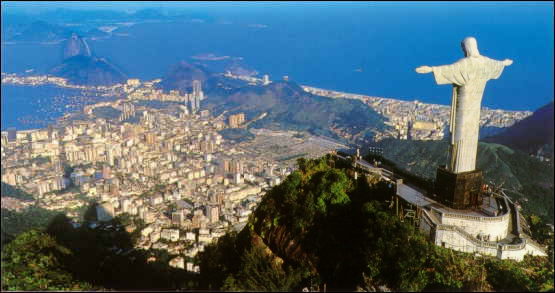
You are listening to One Note Samba from Antônio Carlos Jobim and Newton Mendonça.

You are listening to One Note Samba from Antônio
Carlos Jobim and Newton Mendonça.
![]()
![]()
|
In Brazil, the dance is called samba. The samba, to the purist, since it is the original word in Congo and Zambezi. Here also, like Blues, the samba is an " invention " from black African prisoners interned in the huge South American plantations, the famous latifùndias. But if the Blues is sad like a cotton field, samba is cheerful, furious, and sunny. The Hispanic environment and a less fierce form of slavery then promoted a completely different Negro-American expression, resulting from the same reasons but in completely different conditions. The samba grew, of course, in the most colonised regions, first, in Rio de Janeiro, but also in São Paulo and Bahia. Closer to the Blues is the Saudade, a more nostalgic than sad song. Europe took an interest in samba from 1920. Darius Milhaud included Saudade and samba within some of his compositions. In fact, Villa-Lobos also wrote a classical samba at the beginning of the 50's. However, it seems that the predominance of rhythmical figures and their accentuation have not been adopted easily by the academic culture except on the occasion of exotic quotations (among others, by Milhaud in his Scaramouche). No, the most brilliant offspring of samba was the bossa nova. The paternity is granted to Antônio Carlos Jobim and João Gilberto, at the beginning of the 50's, when Brazil initiated a cultural and economic revolution which was worth a new name : the new wave (nova bossa). The movie Orpheo Negro (palme d'Or of the Festival de Cannes) and the jazz saxophonist Stan Getz popularised bossa nova beyond its wildest dreams. |
|
The world discovered Bossa Nova in 1963 with the huge success of the master Antônio Carlos Jobim's Girl from Ipanema which won four Grammies that year. Antônio Carlos Jobim lives on as one of the fathers of Bossa Nova in the history of music, and one of the major composer of the 20th century. He died the 08 december 1994 in New York City. |
|
![]()
|
|
In 1989, Tom, (Antônio Carlos Jobim's nickname), explains: "In Portuguese, a bossa means a 'boss', a protuberance, a hump, a bump. Like you have the bossa of Notre Dame. And the human brain has these protuberances, these bumps in the head. These convexities correspond to the concavities of gray matter in the brain. So, if a guy has something, it is literally a bump in the brain, a talent for something. To say that he has a bossa for guitar would mean that he has a genius for guitar. So it has come to mean a flair for something and Bossa Nova was a 'new flair'. I believe I was the first guy to write about Bossa Nova, in the liner notes to João Gilberto's album; I used 'Bahiana Bossa Nova'." That phrase translates as 'the new flair from Bahia', referring to João Gilberto's home state. |
|
"My contemporaries and I learned a lot from the Brazilian composers who came before us. People like Pixinguinha, Ary Barroso and Dorival Caymmi left a rastro, a track of beauty for us to follow. When Bossa Nova first appeared in Brazil, though, it had so many adversaries, so many puristas full of animosity. Yet the U.S. loved us. We received so many no's in Brazil, and so many yes's in the States. With hindsight, I can see that the more the U.S. said yes, the more Brazil said no. Our affinity for jazz was part of the problem, and it has come to dominate many people's thinking about our music. Instead of going into history as a branch of samba, which it is, Bossa Nova is viewed by the world as a branch of jazz. Of course, he added, anything that swings today is called jazz, the term has become so encompassing. And the only countries that really swing in their music are the U.S., Cuba and Brazil." Tom Jobim. |
|
![]()
|
|
" Caetano Veloso says many interesting and true things about Bossa Nova. He says among other things that Bossa Nova is a merry, positive music, which takes you along to the sea, to the beach, to love, to marry, to be happy. He says too that Brazil has to deserve Bossa Nova made to be happy. I come from a time when everything was negative, we had to be unhappy. The texts of the Sambas songs were like those of the Argentinean Tangos: " Never again, good-bye... I don't want to remember any more... You cannot disavow my last desire... ". There was a Bolero, it was entitled " Suicide ", at the end we heard the shot, when finally the man committed suicide. Very realistic, incredible! " Tom Jobim. |
|
" The writer Mario de Andrade said : " My son, you must make Brazilian music. If you are Brazilian, make Brazilian
music. If you have talent, make Brazilian music. If you are a genius, you have even more reasons to make Tom Jobim. |
|